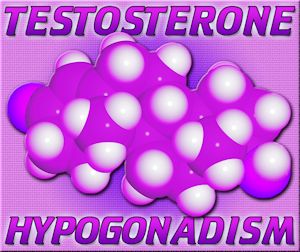Introduction to Late-Onset Hypogonadism
Late-onset hypogonadism (LOH), also known as age-related low testosterone, is a clinical and biochemical syndrome associated with advancing age in men. Characterized by a decline in testosterone levels, LOH can lead to a variety of symptoms that affect the quality of life of American men. This article explores the impact of LOH on men's health, focusing on the symptoms, diagnosis, and management strategies.
Symptoms and Health Implications
The symptoms of LOH can be subtle and often mistaken for normal aging. Common signs include reduced libido, erectile dysfunction, decreased muscle mass, increased body fat, fatigue, and mood disturbances such as depression and irritability. These symptoms not only affect physical health but also have a profound impact on mental well-being and overall life satisfaction.
For American men, the implications of LOH extend beyond personal health. The condition can affect relationships, work productivity, and overall quality of life. Studies have shown that men with LOH are at a higher risk for developing metabolic syndrome, which includes obesity, hypertension, and diabetes, further complicating their health status.
Diagnosis of Late-Onset Hypogonadism
Diagnosing LOH involves a comprehensive evaluation of symptoms and laboratory testing. American men experiencing symptoms suggestive of LOH should consult a healthcare provider for a thorough assessment. Blood tests to measure total and free testosterone levels are crucial in confirming the diagnosis. It is important to conduct these tests in the morning, as testosterone levels can fluctuate throughout the day.
In addition to testosterone levels, healthcare providers may also evaluate other hormone levels, such as luteinizing hormone (LH) and follicle-stimulating hormone (FSH), to better understand the underlying cause of low testosterone. A detailed medical history and physical examination are also essential components of the diagnostic process.
Management and Treatment Options
The management of LOH in American men typically involves a multifaceted approach. Testosterone replacement therapy (TRT) is the most common treatment and can be administered through various methods, including injections, gels, patches, and pellets. TRT has been shown to improve symptoms such as libido, energy levels, and mood, thereby enhancing the quality of life for many men.
However, TRT is not suitable for everyone, and potential risks and benefits must be carefully considered. Men with a history of prostate cancer or cardiovascular disease may need to explore alternative management strategies. Lifestyle modifications, such as regular exercise, a balanced diet, and adequate sleep, can also play a significant role in managing LOH symptoms.
The Importance of Awareness and Education
Raising awareness about LOH is crucial for American men's health. Many men may not recognize the symptoms of LOH or may attribute them to normal aging, leading to underdiagnosis and undertreatment. Education campaigns and open discussions about men's health can encourage more men to seek medical advice and improve their overall well-being.
Healthcare providers play a vital role in educating men about LOH and the importance of early diagnosis and treatment. By fostering a supportive environment, healthcare professionals can help men feel more comfortable discussing their symptoms and seeking appropriate care.
Conclusion
Late-onset hypogonadism is a significant health concern for American men, affecting various aspects of their lives. Understanding the symptoms, diagnosis, and management of LOH is essential for improving the quality of life for affected individuals. Through increased awareness, education, and access to appropriate care, American men can better manage LOH and enjoy healthier, more fulfilling lives.
Contact Us Today For A Free Consultation

- Exploring Alternatives to TRT for Late-Onset Hypogonadism in American Males [Last Updated On: March 9th, 2025] [Originally Added On: March 9th, 2025]
- Nutrition's Role in Managing Late-Onset Hypogonadism in American Males [Last Updated On: March 17th, 2025] [Originally Added On: March 17th, 2025]
- Future of Late-Onset Hypogonadism Treatment: Innovations and Personalized Approaches [Last Updated On: March 17th, 2025] [Originally Added On: March 17th, 2025]
- Late-Onset Hypogonadism: Impact on Mood, Energy, and Quality of Life in American Men [Last Updated On: March 17th, 2025] [Originally Added On: March 17th, 2025]
- Genetic Insights into Late-Onset Hypogonadism in Aging American Males [Last Updated On: March 20th, 2025] [Originally Added On: March 20th, 2025]
- Late-Onset Hypogonadism: Effects on Muscle Mass and Treatment Options in American Men [Last Updated On: March 20th, 2025] [Originally Added On: March 20th, 2025]
- Late-Onset Hypogonadism: Prevalence, Economic Impact, and Management Challenges in American Men [Last Updated On: March 20th, 2025] [Originally Added On: March 20th, 2025]
- Late-Onset Hypogonadism: Symptoms, Diagnosis, and Management in American Males [Last Updated On: March 21st, 2025] [Originally Added On: March 21st, 2025]
- Preventing Complications of Late-Onset Hypogonadism in American Men: Strategies and Insights [Last Updated On: March 21st, 2025] [Originally Added On: March 21st, 2025]
- Late-Onset Hypogonadism: Impact on Fertility and Health in American Men [Last Updated On: March 22nd, 2025] [Originally Added On: March 22nd, 2025]
- Exercise as a Key Strategy for Managing Late-Onset Hypogonadism in American Males [Last Updated On: March 22nd, 2025] [Originally Added On: March 22nd, 2025]
- Late-Onset Hypogonadism: Early Detection and Management in American Males [Last Updated On: March 22nd, 2025] [Originally Added On: March 22nd, 2025]
- Hormone Replacement Therapy for Late-Onset Hypogonadism: Benefits, Risks, and Guidelines [Last Updated On: March 22nd, 2025] [Originally Added On: March 22nd, 2025]
- Understanding and Managing Late-Onset Hypogonadism in American Men Over 40 [Last Updated On: March 23rd, 2025] [Originally Added On: March 23rd, 2025]
- Managing Late-Onset Hypogonadism: Emotional Challenges and Support for American Men [Last Updated On: March 23rd, 2025] [Originally Added On: March 23rd, 2025]
- Stress Exacerbates Late-Onset Hypogonadism in American Males: Management Strategies [Last Updated On: March 23rd, 2025] [Originally Added On: March 23rd, 2025]
- Understanding Late-Onset Hypogonadism: Impacts and Management in Aging Men [Last Updated On: March 23rd, 2025] [Originally Added On: March 23rd, 2025]
- Exploring the Link Between Late-Onset Hypogonadism and Diabetes in American Males [Last Updated On: March 23rd, 2025] [Originally Added On: March 23rd, 2025]
- Late-Onset Hypogonadism: Understanding Symptoms, Impacts, and Management Strategies for American Men [Last Updated On: March 23rd, 2025] [Originally Added On: March 23rd, 2025]
- Late-Onset Hypogonadism: Impact on Sleep and Holistic Management Strategies for American Men [Last Updated On: March 23rd, 2025] [Originally Added On: March 23rd, 2025]
- Late-Onset Hypogonadism's Cognitive Impact in American Men: Awareness and Management Strategies [Last Updated On: March 24th, 2025] [Originally Added On: March 24th, 2025]
- Late-Onset Hypogonadism: Understanding TRT Benefits and Risks in American Males [Last Updated On: March 24th, 2025] [Originally Added On: March 24th, 2025]
- Understanding Late-Onset Hypogonadism: Symptoms, Impact, and Management for American Men [Last Updated On: March 24th, 2025] [Originally Added On: March 24th, 2025]
- Managing Late-Onset Hypogonadism: Symptoms, Diagnosis, and Treatment Options for American Men [Last Updated On: March 24th, 2025] [Originally Added On: March 24th, 2025]
- Dietary Strategies to Manage Late-Onset Hypogonadism in American Men [Last Updated On: March 24th, 2025] [Originally Added On: March 24th, 2025]
- Understanding Late-Onset Hypogonadism: Prevalence, Symptoms, and Management in American Men [Last Updated On: March 24th, 2025] [Originally Added On: March 24th, 2025]
- Late-Onset Hypogonadism: Symptoms, Diagnosis, and Management in American Men [Last Updated On: March 24th, 2025] [Originally Added On: March 24th, 2025]
- Late-Onset Hypogonadism: Prevalence, Risks, and Management in American Men [Last Updated On: March 24th, 2025] [Originally Added On: March 24th, 2025]
- Diagnosing Late-Onset Hypogonadism: Symptoms, Testing, and Challenges in American Men [Last Updated On: March 25th, 2025] [Originally Added On: March 25th, 2025]
- Late-Onset Hypogonadism: Overcoming Stigma and Enhancing Men's Health in America [Last Updated On: March 25th, 2025] [Originally Added On: March 25th, 2025]
- Understanding Late-Onset Hypogonadism: Symptoms, Impact, and Management for American Men [Last Updated On: March 25th, 2025] [Originally Added On: March 25th, 2025]
- Early Intervention Benefits for Late-Onset Hypogonadism in American Men [Last Updated On: March 25th, 2025] [Originally Added On: March 25th, 2025]
- Managing Late-Onset Hypogonadism: Symptoms, Diagnosis, and Treatment for American Men [Last Updated On: March 26th, 2025] [Originally Added On: March 26th, 2025]
- Late-Onset Hypogonadism in American Males: Importance of Monitoring and Management [Last Updated On: March 26th, 2025] [Originally Added On: March 26th, 2025]
- Managing Late-Onset Hypogonadism: A Multidisciplinary Approach for American Men [Last Updated On: March 26th, 2025] [Originally Added On: March 26th, 2025]
- Advocating for Better Late-Onset Hypogonadism Care: A Call to Action for American Men [Last Updated On: March 26th, 2025] [Originally Added On: March 26th, 2025]
- Late-Onset Hypogonadism: Understanding, Managing, and Maintaining Independence in American Men [Last Updated On: March 26th, 2025] [Originally Added On: March 26th, 2025]
- Advanced Technology Enhances LOH Diagnosis in American Males [Last Updated On: March 26th, 2025] [Originally Added On: March 26th, 2025]
- Managing Late-Onset Hypogonadism: Symptoms, Diagnosis, and Treatment for Aging Men [Last Updated On: March 26th, 2025] [Originally Added On: March 26th, 2025]
- Late-Onset Hypogonadism: Diagnosis, Treatments, and Lifestyle Management for American Men [Last Updated On: March 27th, 2025] [Originally Added On: March 27th, 2025]
- Understanding Late-Onset Hypogonadism: Symptoms, Diagnosis, and Treatment for American Men [Last Updated On: March 27th, 2025] [Originally Added On: March 27th, 2025]
- Late-Onset Hypogonadism: Impact on Intimate Relationships and Management Strategies [Last Updated On: March 27th, 2025] [Originally Added On: March 27th, 2025]
- Late-Onset Hypogonadism: Symptoms, Diagnosis, and Management Strategies for American Men [Last Updated On: March 27th, 2025] [Originally Added On: March 27th, 2025]
- Cultural Perceptions and Management of Late-Onset Hypogonadism in American Men [Last Updated On: March 27th, 2025] [Originally Added On: March 27th, 2025]
- Understanding Late-Onset Hypogonadism: Myths, Facts, and Management for American Men [Last Updated On: March 27th, 2025] [Originally Added On: March 27th, 2025]
- Legal Aspects of Late-Onset Hypogonadism: Diagnosis, Treatment, and Rights in the U.S. [Last Updated On: March 27th, 2025] [Originally Added On: March 27th, 2025]
- Holistic Treatment of Late-Onset Hypogonadism in American Males: A Comprehensive Approach [Last Updated On: March 27th, 2025] [Originally Added On: March 27th, 2025]
- Managing Late-Onset Hypogonadism: The Crucial Role of Mental Health Professionals [Last Updated On: March 28th, 2025] [Originally Added On: March 28th, 2025]
- Community Support Enhances Management of Late-Onset Hypogonadism in American Males [Last Updated On: March 28th, 2025] [Originally Added On: March 28th, 2025]
- Family Support Crucial for American Males with Late-Onset Hypogonadism [Last Updated On: March 28th, 2025] [Originally Added On: March 28th, 2025]
- Late-Onset Hypogonadism: Impacts and Strategies for Career Management in American Men [Last Updated On: March 28th, 2025] [Originally Added On: March 28th, 2025]
- Late-Onset Hypogonadism: Financial Implications and Management Strategies for American Men [Last Updated On: March 28th, 2025] [Originally Added On: March 28th, 2025]
- Late-Onset Hypogonadism: Impact on Self-Esteem and Treatment Options for American Men [Last Updated On: April 2nd, 2025] [Originally Added On: April 2nd, 2025]
- Peer Support Enhances Life Quality for American Males with Late-Onset Hypogonadism [Last Updated On: April 2nd, 2025] [Originally Added On: April 2nd, 2025]
- Managing Late-Onset Hypogonadism: Lifestyle Strategies for American Men's Health [Last Updated On: April 2nd, 2025] [Originally Added On: April 2nd, 2025]
- Navigating Insurance Coverage for Late-Onset Hypogonadism: Diagnosis and Treatment Options [Last Updated On: April 3rd, 2025] [Originally Added On: April 3rd, 2025]
- Understanding Late-Onset Hypogonadism: Symptoms, Treatment, and Lifestyle Management for American Males [Last Updated On: April 6th, 2025] [Originally Added On: April 6th, 2025]
- Research Advances in Late-Onset Hypogonadism: Diagnosis, Treatment, and Lifestyle Impact [Last Updated On: April 8th, 2025] [Originally Added On: April 8th, 2025]
- Late-Onset Hypogonadism: Symptoms, Social Impact, and Management in American Men [Last Updated On: April 8th, 2025] [Originally Added On: April 8th, 2025]
- Late-Onset Hypogonadism: Symptoms, Diagnosis, and Management in American Males [Last Updated On: April 9th, 2025] [Originally Added On: April 9th, 2025]
- Managing Late-Onset Hypogonadism: Strategies for Mental Health in American Men [Last Updated On: April 9th, 2025] [Originally Added On: April 9th, 2025]
- Managing Late-Onset Hypogonadism: Stress, Nutrition, and Holistic Approaches for American Men [Last Updated On: April 10th, 2025] [Originally Added On: April 10th, 2025]
- Late-Onset Hypogonadism in American Men: Advocacy and Personalized Care [Last Updated On: April 10th, 2025] [Originally Added On: April 10th, 2025]
- Nutritionists' Role in Managing Late-Onset Hypogonadism in American Males [Last Updated On: April 10th, 2025] [Originally Added On: April 10th, 2025]
- Exercise Strategies to Combat Late-Onset Hypogonadism in American Men [Last Updated On: April 11th, 2025] [Originally Added On: April 11th, 2025]
- Late-Onset Hypogonadism: Prevalence, Impact, and Management in American Men [Last Updated On: April 12th, 2025] [Originally Added On: April 12th, 2025]
- Managing Late-Onset Hypogonadism: Symptoms, Diagnosis, and Treatment for American Men [Last Updated On: April 12th, 2025] [Originally Added On: April 12th, 2025]
- Late-Onset Hypogonadism: Understanding and Managing Emotional Impacts in Men Over 40 [Last Updated On: April 14th, 2025] [Originally Added On: April 14th, 2025]
- Endocrinologists' Vital Role in Managing Late-Onset Hypogonadism in Aging American Males [Last Updated On: April 14th, 2025] [Originally Added On: April 14th, 2025]
- Late-Onset Hypogonadism in American Men: Diagnosis, Treatment, and Management Strategies [Last Updated On: April 16th, 2025] [Originally Added On: April 16th, 2025]
- Managing Late-Onset Hypogonadism: Lifestyle and Medical Interventions for American Men [Last Updated On: April 16th, 2025] [Originally Added On: April 16th, 2025]
- Late-Onset Hypogonadism in American Males: Symptoms, Diagnosis, and Comprehensive Care Strategies [Last Updated On: April 17th, 2025] [Originally Added On: April 17th, 2025]
- Holistic Management Strategies for Late-Onset Hypogonadism in American Men [Last Updated On: April 17th, 2025] [Originally Added On: April 17th, 2025]
- Managing Late-Onset Hypogonadism: Impact and Strategies for American Men's Sexual Health [Last Updated On: April 18th, 2025] [Originally Added On: April 18th, 2025]
- Late-Onset Hypogonadism: Impact, Research, and Future Directions in American Men's Health [Last Updated On: April 18th, 2025] [Originally Added On: April 18th, 2025]
- Managing Late-Onset Hypogonadism: Community Resources and Support for American Men [Last Updated On: April 19th, 2025] [Originally Added On: April 19th, 2025]
- Late-Onset Hypogonadism: Impact on American Men's Professional Lives and Management Strategies [Last Updated On: April 19th, 2025] [Originally Added On: April 19th, 2025]
- Therapists' Vital Role in Managing Late-Onset Hypogonadism in American Males [Last Updated On: April 19th, 2025] [Originally Added On: April 19th, 2025]
- Late-Onset Hypogonadism: Impacts and Management in Aging American Men [Last Updated On: April 22nd, 2025] [Originally Added On: April 22nd, 2025]
- Late-Onset Hypogonadism: Symptoms, Impact, and Management in American Men [Last Updated On: April 22nd, 2025] [Originally Added On: April 22nd, 2025]
Word Count: 556





















